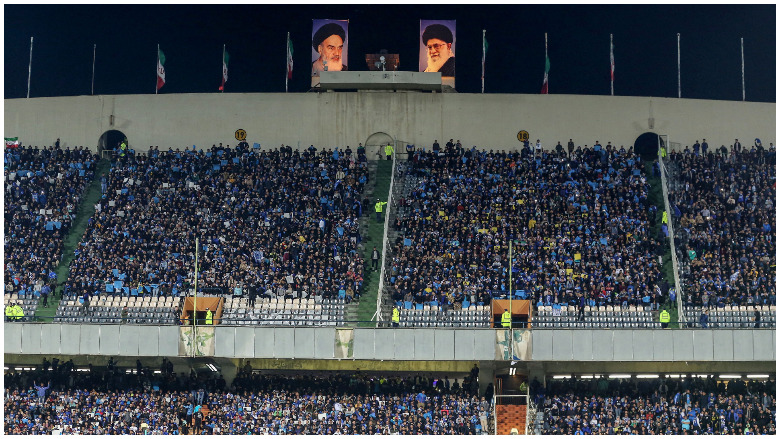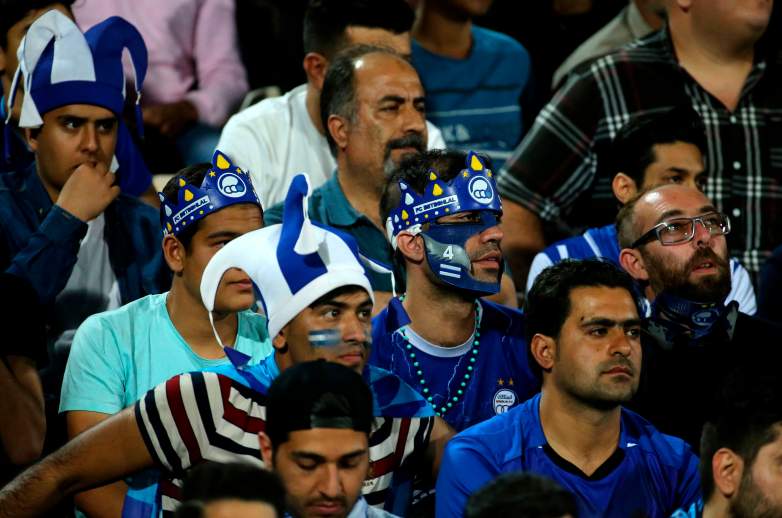
Getty The Iranian blue girl is dead.
The young woman known as the Iran “blue girl” has died from the wounds she suffered after setting herself on fire because she was forced to stand trial for trying to enter a soccer stadium disguised as a man. Iran bans women from entering soccer stadiums.
According to the BBC, the blue girl’s death was revealed on September 10, 2019. She came to be known by that moniker on the Internet because blue is the color of her favorite soccer team, called Esteqlal of Tehran. However, Fox News gave her real name as Sahar Khodayari.
“All people, including women in #Iran, have the right to enjoy the beautiful game. @FIFAcom must uphold its statutes against discrimination and follow through on its call for Iran to lift its ban on women in stadiums. Football stars/fans, please speak up for #Iran’s #blue_girl,” wrote Iran Human Rights.org on Twitter.
Here’s what you need to know:
1. The Iran ‘Blue Girl’ Set Herself on Fire Outside the Courthouse

Esteghlal supporters attend the AFC Champions League group C football match between Iran’s Esteghlal and Qatar’s Al Duhail at the Azadi Stadium in Tehran on May 6, 2019.
The details of why the blue girl set herself on fire were described by BBC. The British news site reported that her act came after she heard that she could face six months to two years in prison for trying to enter the stadium.
Khodayari was facing a trial, which had been briefly postponed. She was released on bail after being held in jail for three days, according to BBC.
The blue girl’s death was confirmed by Shafaghna news agency. Amnesty International explained that, in March 2019, “in defiance of Iran’s ban on women entering football stadiums, 29-year-old Sahar Khodayari dressed as a man and attempted to enter Iran’s national football stadium in Tehran to watch a match between her favourite football team, Esteghlal of Iran, and Al-Ain of the United Arab Emirates, during the AFC Asian Cup.”
The organization added: “She was stopped from entering when the stadium’s security guards discovered she was a woman. She was consequently detained in Shahr-e Rey prison (also known as Gharchak), which is a disused chicken farm that holds several hundred women convicted of violent offences in overcrowded and unhygienic conditions, before being released on bail two days later.”
2. Sahar Khodayari Wore Blue Clothing to the Stadium & Studied Computer Science

Esteghlal’s midfielder Farshid Bagheri (C) celebrates with his teammates after scoring the equaliser during the AFC champions league Group C football match between Iran’s Esteghlal and UAE’s Al Ain at the Azadi stadium in the Iranian capital Tehran on March 12, 2019.
In addition to it being the colors of her favorite team, the young woman donned blue when she tried to get into the stadium, according to Fox News.
Fox reported that she “wore a blue hairpiece and a long overcoat” while pretending to be a man at the stadium in March 2019, but police stopped her.
The young woman had studied computer science, Fox reported. According to Amnesty International, Sahar set herself on fire outside the courthouse, receiving burns over 90 percent of her body, and she died on September 9, 2019.
3. Women in Iran Have Been Banned From Soccer Stadiums Since the 1980s
According to Human Rights Watch, Iran has banned women from watching soccer games at stadiums since 1981. Thus, some women have dressed as men – Sahar is not the first – to get into the matches.
They also have been known to protest their exclusion on social media and in protests, Human Rights Watch reported.
The blue girl’s charges were for “improperly wearing hijab,” that organization reported. “Sahar’s tragic arrest, jailing, and suicide attempt underscore the need for Iran to end its ban on women attending sports matches – and the urgency for regulating bodies like FIFA to enforce its own human rights rules,” the group said in a statement. Amnesty International reported the charges as “openly committing a sinful act by… appearing in public without a hijab” and “insulting officials.”
4. Sahar Had Bipolar Disorder, Her Sister Told Iranian Media

Duhail’s forward Youssef El-Arabi (C) vies for the ball with Esteghlal’s goalkeeper Hossein Hosseini (R) and defender Pejman Montazeri (L) during the AFC Champions League group C football match between Iran’s Esteghlal and Qatar’s Al Duhail at the Azadi Stadium in Tehran on May 6, 2019.
Sahar’s sister spoke to Rokna, which is an Iranian news outlet. She said that morality police had arrested Sahar outside Iran’s main sports complex, Azadi (Freedom) stadium.
She also said that Sahar had bipolar disorder and “her mental health deteriorated while in prison,” the Human Rights Watch reported of the Rokna translation.
Earlier in August, four Iranian women were detained by authorities when they tried to enter a stadium to protest the ban.
5. People Supported the Blue Girl & Used Her Situation as a Rallying Cry for Human Rights for Iranian Women
The Iranian blue girl and her death have become a rallying cry on social media to give women more human rights in Iran. “Her crime was that she wanted to watch the match of her favorite team! #Iran is the only country in the world that stops and punishes women seeking to enter football stadiums,” one person posted on Twitter.
Amnesty International’s Middle East and North Africa Research and Advocacy Director, Philip Luther, said: “What happened to Sahar Khodayari is heart-breaking and exposes the impact of the Iranian authorities’ appalling contempt for women’s rights in the country.”
Amnesty International wrote on its website, “While the Iranian authorities have allowed small numbers of women to enter football stadiums on a handful of occasions, these have amounted to nothing more than publicity stunts, rather than meaningful steps to lifting the ban on women altogether. Amnesty International believes that Sahar Khodayari would still be alive if it were not for this draconian ban and the subsequent trauma of her arrest, detention and prosecution for attempting to circumvent it. Her death must not be in vain. It must spur change in Iran if further tragedies are to be avoided in the future.”
READ NEXT: Man Accused of Threatening Mass Shooting at Stadium.

